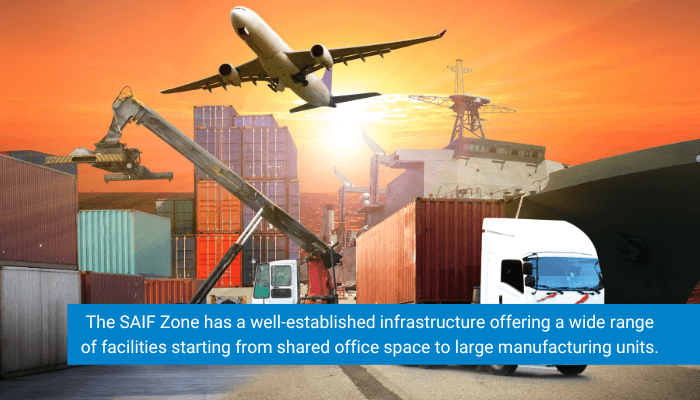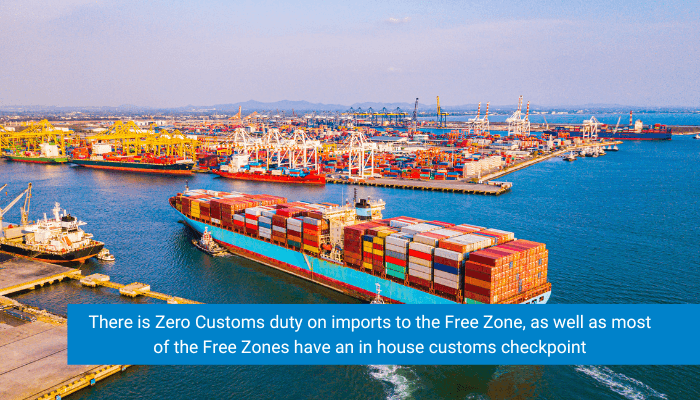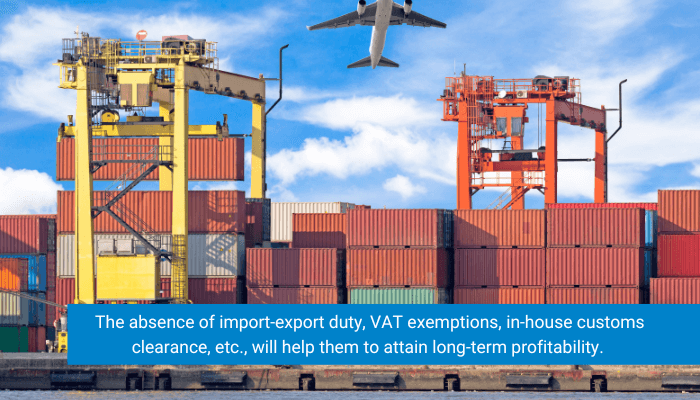How to Import and Export Goods from a Free Zone in Sharjah? – Things to Know
Sharjah is one of the major Trade and Commerce hubs of UAE. It is an ideal location for import-export companies due to the proximity of the Sea Port and Airport with the Free Trade Zones. The Sharjah Airport International Free Zone (SAIF Zone) is one of the most preferred Free Trade Zone in the Emirate by investors.
The SAIF Zone is a designated zone (VAT Free Zone) and has an in-house customs checkpoint for easy clearance of shipments. The proximity to Sharjah airport makes it a preferred choice for trading and import-export companies.
The Free Zone is the perfect choice for a wide range of companies such as air freight forwarding companies, international distribution companies, and trading firms to easily transport goods to global markets.
Why Choose SAIF Zone for Setting up a Trading Company?
The SAIF Zone has a well-established infrastructure offering a wide range of facilities starting from shared office space to large manufacturing units. It caters to a large business community with varying business requirements.
It is also close to the busy seaport, the Khalid Port, and two other deepwater ports the Khorfakkan Port and Hamriyah Port, facilitating faster and more streamlined import-export operations.

SAIF Zone offers investors a host of business benefits along the lines of operational efficiency, lowering costs, and expansion to international markets. The company setup process in the Free Zone is easy and hassle-free.
The Free Zone offers a cost-effective Trade License package, office space, and warehouse facilities to the investors. It is a perfect choice for setting up an import-export company in the UAE.
How Do the Import Export Companies Operate in a Free Trade Zone based in UAE?
For starting an Import Export Company anywhere in the world and successfully operating it to achieve business growth, it is a pre-requisite to know more about the Import, export tax, customs duty, and other taxation norms of the area where the business is operating.
In UAE, there are two major business jurisdictions for company formation – The Mainland and the Free Zone. They have distinct characteristics and business benefits. For Trading Companies especially to facilitate import, export, and trading in international markets, the Free Zones are the right choice.

There is Zero Customs duty on imports to the Free Zone, as well as most of the Free Zones have a customs checkpoint and are in proximity to the busiest Airports and seaports of UAE.
Also, the Free Zones in UAE have good connectivity by roads to major business centers and consumer markets across the UAE and Oman.
Hence, with the well-established logistics, storage facilities, and transportation network, the Free Zones are ideal destinations for an international trading company to easily facilitate faster trade operations.
What are the benefits of Starting an Import – Export Company in a Designated Free Zone?
A designated Zone as specified in the UAE Cabinet decision is a VAT Free Zone. For VAT, the designated Free Zones are considered to be out of the purview of VAT.
The Designated Free Trade Zones in UAE is where the VAT is charged at ‘Zero Percent’ or there is no VAT payment required for companies trading in the Designated Free Zone. There are few conditions to be met for classifying the transaction as VAT free.

For an Import-Export Company being in a designated Zone has many advantages. The absence of import-export duty, VAT exemptions, in-house customs clearance, etc., will help them to attain long-term profitability.
Designated Zone’s movements of Goods for VAT treatment:
The import export operations through Designated Free Zone has many advantages such as VAT Exemptions, Import Duty Exemptions, in-house Customs Clearance, etc. The following table highlights the movement of Goods and related VAT applicability on the transfer of goods to and from the Free Zone.
| FROM | TO | VAT Treatment |
| Designated Zones | Designated Zones | Non-Taxable |
| Designated Zones | Mainland | Taxable (5% UAE VAT) |
| Mainland | Designated Zones | Taxable (5% UAE VAT) |
| Designated Zones | Foreign Countries/GCC Countries | Non-Taxable |
| Foreign Countries/GCC Countries | Designated Zones | Non-Taxable |
Required Documents for Free Zone Importing and Exporting Goods
To initiate the import and export of goods there are various documents required for the smooth transfer. The movement of Goods to and from the Free Trade Zones are regulated by the respective Free Zone’s Customs Department.
There are several ways the Goods can be transferred to and from the Free Zones in UAE. Following are the most common ways of goods transfer to and from the Free Trade Zones in UAE. There are few documents required by the authorities depending on the mode of goods transfer.
1. Importing Goods to Free Zone from Foreign Country/Outside UAE:
- Bill of Lading/Custom Bill (Air Way Bill or Bill from Terminal of Arrival)
- Suppliers Invoice
- Packing Lists/Delivery Note
- Bill of Entry (Free Zone Customs Form) to be filled upon entering of goods
2. Importing Goods to Free Zone from Mainland:
- Suppliers Invoice
- Packing Lists/Delivery Note
- Bill of Entry (Free Zone Customs Form) to be filled upon entering of goods
3. Exporting Goods to Foreign Country/Outside the UAE from Free Zone:
- Bill of Entry
- Suppliers Invoice
- Invoice to Customer
- Packing Lists//Delivery Note
- Bill of Exit (Free Zone Customs Form) to be filled upon exiting of goods
4. Exporting Goods to Mainland from Free Zone:
- Bill of Entry
- Suppliers Invoice
- Invoice to Customer
- Packing Lists//Delivery Note
- Bill of Exit (Free Zone Customs Form) to be filled upon exiting of goods
Note:
- In exporting goods to Mainland distributor is not required or Mandatory, that depends on the agreement between the Supplier and Customer.
- 5% duty is imposed on goods imported from abroad excluding goods in transit to GCC countries. However, the duty varies on some goods according to the tariff.
- Goods originating from GCC countries are treated as UAE local goods, provided that 40% of the raw materials used for manufacturing such goods is originated in the GCC
Import Operations through Sharjah Port – Things to know
The Sharjah Port handles huge volume of trade in UAE. It is one of the busiest Ports in the UAE. The companies operating in the Free Zones of UAE can opt for shipping their goods or importing goods to UAE via the Sharjah Port.
Hence, If the Import Operations is through Sharjah Port, then the documents will be as follows:
- Delivery Note
- Packing Lists
- Original Invoice from Supplier
- Attested Certificate of Origin
- Bill of Lading
- Receipt of Custom Duties/settled payment
- Inspection Report from Sharjah Port
- Bill of Entry/Import Declaration
If the above documents are not completed, then the amount of AED 1000 to be deposited and can only be refunded after completion of the required documents.
Export Operation through Sharjah Port
Below are the documents required for conducting Export Operations through Sharjah Port:
- Original Invoice
- Bill of Exit/Export Declaration
To know more about Designated Free Zone for VAT or Starting a Trading Company in the UAE Free Zones, talk to our expert team right away!
Read more about “Tips for Setting up a Trading, Logistics, or Supply Chain Company in Dubai“.







2 Responses